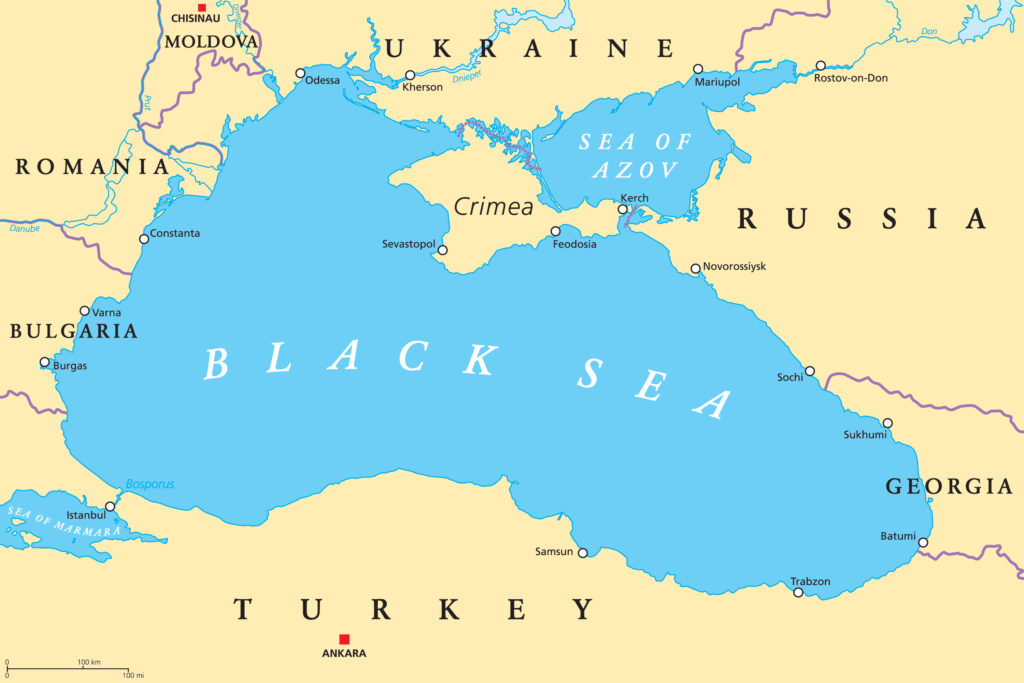What you need to know about security in the Black Sea
The Black Sea holds tremendous strategic importance amid the war between Russia and Ukraine and also promises economic opportunity for surrounding nations

Key Takeaways
- Russia’s invasion of Ukraine is the greatest threat that Europe has faced since WWII, according to the United States Assistant Secretary of Defense for International Security Affairs.
- The Black Sea plays a critical role in this conflict—linking powers like Russia, Europe, and the Middle East.
- To highlight these important issues, the SAIS Caucasus and Central Asia Club collaborated with the Caspian Policy Center to organize a conference based on defense and economic and energy security issues in the region.
The Black Sea has been a hub for global connections and clashes for centuries. Among all the maritime spaces in the world, the highest number of wars—including the ongoing conflict between Russian and Ukraine—have occurred in the Black Sea since the end of the Cold War.
The Black Sea, on the crossroads of Europe and Asia, links some of the world’s greatest powers. Since Russia invaded Ukraine in early February 2022, the Black Sea has been used as a strategic asset for all countries involved. Russia’s presence in the Black Sea not only poses a national and global security threat, but also creates challenges for economic and energy security. Yet experts note the challenges also open the door for opportunities.

“There is enormous potential in the lands from the Black Sea to the steppes of Central Asia,” said Marsha McGraw Olive, faculty advisor for the SAIS Caucasus and Central Asian Club and Caspian Policy Center board member, during the Johns Hopkins School of Advanced International Studies’ Black Sea Security Conference on Jan. 24. “We are nurturing the younger generation of policymakers and bringing together voices of academia, business, and government to raise new perspectives, cultivate fresh ideas, and debate them to solve regional challenges.”
According to Mariami Tkeshelashvili and Rachel Shifman, co-presidents of the Caucasus and Central Asia Club, the conference was inspired by the increased interest among SAIS students in discussing the security environment of the Black Sea region amid Russia’s full-scale invasion of Ukraine. “We wanted to provide a platform for balanced and multifaceted analysis of the current events not only concerning Ukraine, but in other countries as well,” they said, “where Russia is trying to revamp what the Kremlin calls its exclusive sphere of influence, including Georgia and Moldova.”
Here are some of the security challenges—and opportunities—in the Black Sea.
Defense Security
Russia has used the Black Sea as a strategic weapon throughout its war on Ukraine.
“Russia’s actions and investments in the region demonstrate the strategic importance it places on the Black Sea as a region from which to project economic and military power,” said Celeste Wallander, assistant secretary of defense for international security affairs at the U.S. Department of Defense and keynote speaker at the conference.
Russia has also leveraged the Black Sea to strengthen relationships in the Middle East, Wallandar added. She pointed to Russia’s use of the Black Sea to intervene in Syria in support of the Assad regime in 2015.
The U.S. has prioritized supporting and bolstering its allies in the region in response, she explained. The U.S. ordered the deployment of a rotational Brigade Combat Team in Romania to conduct exercises and to be ready to support any NATO allies in the Eastern region. Additionally, the U.S. has supported the United Kingdom and Norway in their work rebuilding and helping to broaden Ukraine’s navy.
“This maritime coalition … will not only build on Ukraine’s existing and quite successful efforts to keep Russia out of the northwestern portion of the Black Sea, but also strengthen Ukraine’s naval capacity and capabilities to safeguard its territory and its economy in the coming years,” Wallander said.
The United States has also looked to countries like Türkiye who want to keep the Black Sea open to trade and commerce to prevent Russia’s military sovereignty in the region, Wallandar added.
Economic and Energy Security
The Black Sea also provides tremendous economic growth opportunities for surrounding countries, Wallander said. The nations around the Black Sea region total nearly $3 trillion in combined GDP, as a result of trading grain, petroleum, and more throughout Europe, Asia, the Middle East, and beyond.
If Russia blocks any of this trade, she warned, it will have devastating effects on Ukraine’s economy and that of its surrounding neighbors. Ukraine has successfully been able to stop the Russian naval blockade in Odesa—allowing 13 million tons of cargo to pass through the Black Sea Humanitarian Corridor since August, according to a recent report in The Hill.
To counterbalance Russia’s influence, the U.S. has also prioritized the protection of Ukraine’s energy and critical infrastructure, such as electrical grids, heating and energy systems, and port cranes, which has been critical to their resilience throughout the war, she said.
The Black Sea will continue to be a key area in the war between Russia and Ukraine, and in maintaining national and global security for years to come.
“Ensuring the Black Sea remains a safe place to conduct maritime traffic for all nations—including the shipment of vitally premium agricultural products to the global south—is a priority for the United States,” Wallander said.